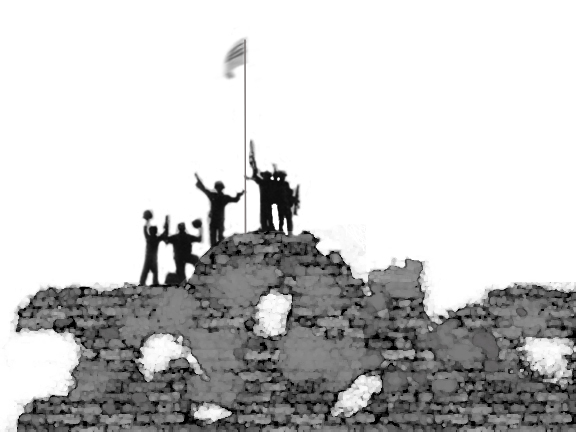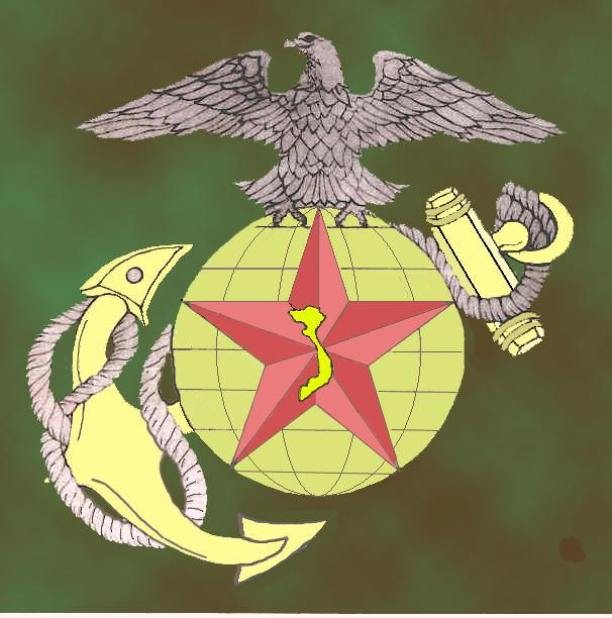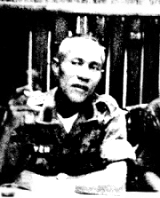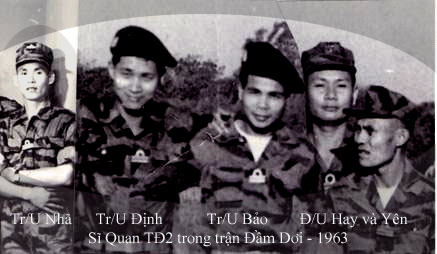 
| Home | Memory | Young Marines | VNMC Combat | News | Link | Vietnamese | |
||||||||||||||||||
Whenever the nickname “White Haired Old man”
was mentioned, everyone in the Marines immediately knew who it was. Many of our
brothers-in arms had nick names. For example, Hai Chua, Chau Phuoc Hiep ...etc.
But everbody spoke of the “White-Haired Old Man” with respect and affection.
He was Colonel Nguyen Thanh Yen, Assistant
Commandant of the Vietnamese Marine Division. He was born in Dalat, and
graduated from the Dalat National Military Academy. He first served in the Airborne Division,
fighting in North Vietnam. In 1954, he followed his unit to the South.
In 1956, he was first lieutenant and volunteered to be transferred to
the Marines, which had been formed from elements of the riverine forces of the
navy, army commandos who came from the North before 1954, and army commandos of
the South. The 2nd Marine Battalion was formed in Rach
Dua, Vung Tau. It then moved to Cam Ranh to be equipped, trained, and receive
manpower from Marine recruit posts. 1st Lieutenant Yen became Commander of the 2nd
Marine Battalion around 1959. He was a true soldier at heart, and always
executed his orders and fulfilled his tasks. He had unlimited enthusiasm for the
Nationalist cause, the ARVN, and the Marine Corps. He was open, and straight
forward. He never used tricks or manoeuvres to harm anybody. He never did
anything for his own private gain, although he had a large family - a wife and
ten children. He loved his subordinates like his own
brothers. Occasionally, when confronted with some undisciplined soldiers, he had
the habit of using his right hand to pass over his short white hair, and queried
them with short sentences. Huh? Huh? he used to grunt threateningly as he
prodded them with his elbow. Being of short stature, he sometimes fell down as
he administered the prodding. Invariably he would laugh, get up, and embrace the
soldier. Once his anger was over, he never held a grudge. Because of this habit,
he was also dubbed “Old Huh”. In the Marine Corps, he was not only liked
because of his openness but also respected for his audacity and inspired
commanding on the battlefield. He contributed greatly to the victory of ARVN and
honour of Marine Corps in the initial stages of the war against the Communist
North Vietnam. I recall clearly the campaign which the V.C
had boasted as a “Simultaneous Upheaval” in Kien Hoa in 1960. In reality, it was
a simple event: undercover Communist cadres forces women and children to go to
the market of Giong Trom suburb, District of Mo Cay to demonstrate against the
South Vietnamese Government. The Marine Group, commanded by Major Le Nhu
Hung received orders from the Joint General Staff to send the 2nd Marine
Battalion to deploy. They were to keep the security in the suburb of Giong Trom
and to protect the route leading to Truc Giang City (Kien Hoa) and the 1st
Marine Battalion commanded by the Captan Nguyen van Tai to keep security
in Mo Cay suburb and the route leading to the Truc Giang City. During this period, there were only skirmishes
at squad level. Marine Companies changed their tactics to disperse very thinly
to be able to Search and Destroy the enemy and at the same gather information.
First Lieutenant Yen ordered several soldiers
to wear civilian plain clothes and masquerade as motorbike drivers or xe loi
drivers (a “xe loi” is a motobike which has a passenger box in the back). They
were to carry civilians to Giong Trom market, to Binh Dai District, Ba Tri
district or Truc Giang City, so they could gather information about enemy
activities from them. Not all these soldiers were accustomed to
driving xe loi's. A couple of accidents occurred on bumpy roads, sending the
driver and passenger headlong into the ditches. Luckily, no one died or were
severely injured. One night, the whole unit was entertained.
First Lieutenant Yen had the idea of trying to drive a xeloi himself. I had to
intervene several times. (At this stage I was Executive Officer of the 2nd
Battalion.) His drinking capacity was also very high. When
the alcohol impregnated his blood, the sky was no limit. I was his equal, but, I
always restrained myself to be in control of the situation. His subordinates, the Company Commanders were:
First Lieutenant Nguyen van Hay, nicknamed Hai Chua. First Lieutenant Nguyen
Cong Minh, nicknamed Emile. First Lieutenant Nguyen Van Khai First Lieutenant Do
Ky, Chief of S3. Others included: Master Sergeant Chung Van Nghiem Corporal La Kum, whose hand was so strong that
he once strangled a moderate size hog to death. They were audacious and experienced - most had
been from the Commando units in the North, Centre and South of Vietnam. Others
were soldiers from religious sects. The more I lived with them, the more I liked
them. They were absolutely anti-communist, which was a very cohesive sentiment
in the unit. They were proud to wear a green beret and the special fatigues of
the Marines, the printed design of which was reminiscent of waves hitting the
seashore. During this period, the situation at Mo Cay district where the 1st
Marine Battalion was in charge, was rather troublesome. During a search for the
enemy in a coconut forest, the squad led by Master Sergeant Pham Khac Dat was
ambushed by the enemy. The VC had dug holes, and had hidden themselves in them,
and covered the tops with a net camouflaged with leaves and hay. When our
soldiers marched pass, they lept out and attacked with scimitars and bayonets.
This tactic was known as “don tho”. The Marine Squad fought back courageously,
quashed the ambush, conserving all weapons. But unfortunately, Master Sergeant
Dat was killed in action. A few others were wounded. In his memory, the Marine Corps named the 1st
Marine Battalion's camp in Rung Cam, Thu Duc, after his name. It was the first
camp to be named after a slain hero. Later, the camp of the Amphibious Support
Battalion carried the name of Major Nguyen Van Nho. The street stretching from
that Battalion to Thi Nghe market was also named after him. Major Nho was killed
in action in the battle of Binh Gia, Phuoc Tuy Province. Ap Bac and Binh Gia were two big battles at
that time. First Lieutenant Chau, a.k.a “Chau Phuoc Hiep”,
Commander of the 3rd Company/1st Marine Battalion was with his men performing
activities at Mo Cay. Angered with the “don tho” tactics of the enemy, he sent
troops to “search and destroy” suspected enemies in the village of Phuoc Hiep.
The enemy paid a high price. After that, they avoid confrontation, and First
Lieutenant Chau earned his nickname. Officers in the 1st Marine Battalion at that
time was composed of: Executive Officer, First Lieutenant Le Van
Hien. Company Commanders: First Lieutenant Hoang Tich Thong There were many other excellent officers.
After two months recruiting in the region
recovered, the Marine Group left Kien Hoa for Cuu Long Delta. Major Le Nhu Hung
was appointed by President Ngo Dinh Diem as Chief Secretary of Military Affairs.
Major Hung transferred his position to Major Le Nguyen Khang. First Lieutenant Yen received orders to move
his battalion to reinforce the District of Camau to protect the formation and
building of “Prosperous Areas” - especially the one in Cai Nuoc which had been
organized by Father Nguyen Lac Hoa. Because it was a large area, and the enemy
was still weak, the battalion headquarters positioned at the city and only the
companies spread out into areas of responsibility to performed activities. There
were no Artillery and Airpower supports. The 2nd Company of First Lieutenant Hai
Chua was in charge of recruiting for Father Hoa's prosperous area. The 3rd
Company of First Lieutenant Co Tan Tinh Chau, stationed at Cai Bat 15km south of
the prosperous area. This was the important “throat” situated
between Cai Bat River and Bay Hap River. The only means of communication and
transportation was via civilians sampans. Although they carried out separate operations
in different areas, all companies were always ready to support each other. A
Field Battalion Staff led by myself was positioned with the 3rd Company to
co-ordinate manoeuvres. This was an isolated, sparsely populated area without
any government regional troops. The enemy were free to do whatever they liked.
After a month, there were no skirmishes except for the odd gun shot from the V.C,
or the sound of propaganda from their megaphones echoing throughout the hamlets.
Then bad luck struck the Battalion Commander.
The Bravo Command Group received a telegram
saying the next morning that the Battalion Commander would come with the
Military Financial Group to visit and pay companies at Cai Nuoc. The next
morning, First Lieutenant Yen, his escorts, and the Military Treasury (led by
Gunnery Sergeant Phat) boarded a sampan. The group totally 10 in number, and
were armed with personal weapons (carbin, garant M1 *), and a light BAR machine
gun. The boat left the small port in Camau, sailed
along Bay Hap River, then Cai Bat River, and finally reached the 3rd Company
position at 11 am. The 3rd Company cleared the road and kept security of the
15km river, while groups of threes from the 2nd Company used sampans to reach
the location of the Military Financial Group to receive their monthly salary and
to sign a money order for their families. After that, they changed with the 3rd
Company. With a distance of 15km, a company could not possibly exert effective
control. At 3.00pm, First Lieutenant Yen and the
Military Financial Group returned by the same boat to mouth of the Bay Hap to
get back to Ca Mau. An hour later, the sound of gunfire came in
the direction of Cai Bat. The platoon midway along the road reported via radio
that after the boat had passed them, gunfire was heard barely fifteen minutes
later - and that the platoon was on its way to the rescue. The enemy force was also about one platoon.
They had investigated the terrain and had known the timing of the Military
Financial Group's visit. The leak had come from the Marines, who inadvertantly
told the civilians they were mixing with of the visit. At the curve of the river, the boat had had to
slow downn, and it was at that moment that the enemy struck. The pilot was
injured, and lost control of the boat. It crashed onto the banks of the river.
First Lieutenant Yen and his soldiers had no time to react. Sitting in the boat,
they were easy targets - the sides were made of wood, offering no protection.
Gunnery Sergeant Phat and two other Marines were killed. First Lieutenant Yen
was shot in the chest, sending bloot spurting everywhere. He audaciously fired
back at the enemy with his pistol, making good show of calmness to encourage the
soldiers to follow suit. In the next wave of attack, three VC lept aboard. The
first VC for some bizarre reason, did not carry a riffle, but instead held a
string of exploding firecrackers. Before the other two had fully succeeded in
jumping on, the Marine reinforcement platoon arrived and opened fire.
Fearing that they might hit their brothers in
the boat, they shot at the river bank as they charged the situation. The enemy,
surprised, ran away. Review of the skirmish found that Gunnery
Sergeant Phat and two soldiers were dead, three others were wounded, and First
Lieutenant Yen was severely injured in the chest. Weapons were conserved, as was
the safe and the letters the Marines had written to their families. The enemy
had managed to grab a rucksack as they were leaving. At that time, there was no such thing as
medevac by helicopter. The only way was by sampan or motorized boats. The first
was slow, the second was quicker. The Marines did not have a motorized boat of
their own, so we had to hire one. Luckily, a motorized boat came from the
direction of the mouth of the Bay Hap river, Gunnery Nghiem stopped it and asked
for transportation to Ca Mau. It reached there at 10.00 pm. The unit truck was
there, waiting to transport the wounded to the civilian hospital in the city.
The road was 1km long - bumpy, full of
pot-holes that caused the chest wound of First Lieutenant Yen to bleed
profusely. Fortunately he reached the hospital on time to receive treatment.
Later, the district S2, which was gathering
information on enemy activities, revealed that the enemy had planned to
masquerade as his relatives to enter the hospital to assassinate him.
Fortunately, they missed their chance. He had already been transferred to Can
Tho Hosptial for further treatment, after which he was sent to the Military
General Hospital in Saigon. Not long after his recovery, he wanted to
rejoin the unit. Everybody welcomed him warmly, as if he was an elder brother
coming home from a long trip. After that, the unit went on to gain victory after
victory, and the “White-Haired Old Man” was always present at them.
At Dam Doi, the 2nd Marine Battalion gained
victory in 1962 - an achievement that was incorporated into our Marine march
song. Dam Doi district had been besieged by the enemy, and the 2nd Battalion
managed to break their encirclement, seizing a cache of personnal weapons and a
collective SKZ made in China. In the Coup of November 1st, 1963, the Coup
organizers kept Captain Yen in the Joint General Staff Headquarters with Colonel
Cao Van Vien and many other officers - fearing that they would not comply. They
knew that Captain Yen was a true soldier at heart, a Catholic who never wanted
to involve himself in politics. After the political situation was normalized
again, Captain Yen returned to become commander of the Task Force B, and later
went on to become Assistant Commandant of the Marine Division. In any position, he was always in the thick of
the battle. He was present at many battles - from the conquest of the Fulro
Group in Ban Me Thuot, to the big confrontations at Pleime Duc Co, Bong Son, Phu
Cu, Tam Quan, Doi Muoi, and Mang Yang Pass. At Mang Yang, the Marines had to
endure cold foggy nights for long periods to protect the circulation from Qui
Nhon to Pleiku. Bunyo Ishikawa, a Japanese war correspondant,
working for Newsweek at that time, wrote several reports and took several
photos, praising the Marine units and their commanders. Once, a photo of
Lieutenant Colonel Nguyen Thanh Yen with General Westmoreland and other officers
made the front page under the caption: “Field Commanders in the Vietnam War.”
In 1966, in the “Central Vietnam Buddhist
Rebellion”, the Marine Brigade led by Lieutenant Colonel Yen, the 1st Marine
Battalion led by Major Ton That Soan, and the 2nd Marine Battalion commanded by
Major Le Hang Minh, were sent to re-establish social order and political
security. He and Lieutenant Colonel Bui The Lan were both promoted to Colonel in
this occasion. At the beginning of 1970, he left the Marine
Corps and was transferred to Quang Da Special District to take the position of
Operation Assistant to I Corps Commander, Lieutenant General Hoang Xuan Lam.
Early in 1971, he was demobilized. He live in
a house with an orchard next to a canal. It was also the home of his
brother-in-law, Colonel Nguyen Van Hiep of the Ranger Group. They had married
into the same family. One day, he drowned in the canal, leaving behind many
friends, family members and brothers-in-arms to mourn him. Time passed, and our country fell into a
miserable state... people dispersed all over the world, and most of the South
Vietnamese Army troops were in Communist concentration camps. Now in free countries, we all try to keep in
touch with our brothers-in-arms. Such reunions bring forth a mixture of sadness
and happiness. All the memories are resurrected - even the ones 40 years ago are
recounted in detail. Geographic names such as Cai Bat, Nam Can, Cai Nuoc, Dam
Doi are mentioned. And of course, the “White Haired Old Man” is remembered with
love and respect. Even though the stars might move and the
environment may change, the hearts of the Marines never do. It moves me everytime I think of the eternal
bond between the Marines. The same strong sentiments made me write these lines -
a brief eulogy of Colonel Nguyen Thanh Yen, which reflects the mutual feelings
we Marines have for the “White Haired Old Man.
Mọi tin tức, bŕi vở muốn post tręn wesite xin email bixitrum@yahoo.com l Trang chính l Chiến sĩ Vô Danh l Young Marines l Sư Đoŕn TQLCVN l Tin tức nội bộ l Trang Web bạn l |
||||||||||||||||||
|
||||||||||||||||||
|
||||||||||||||||||

